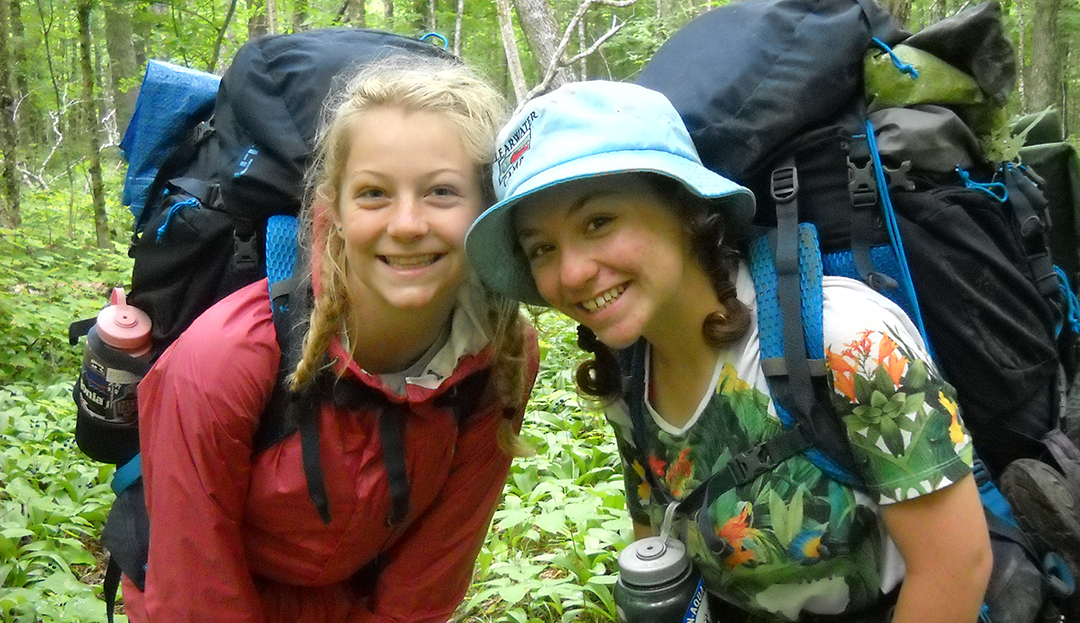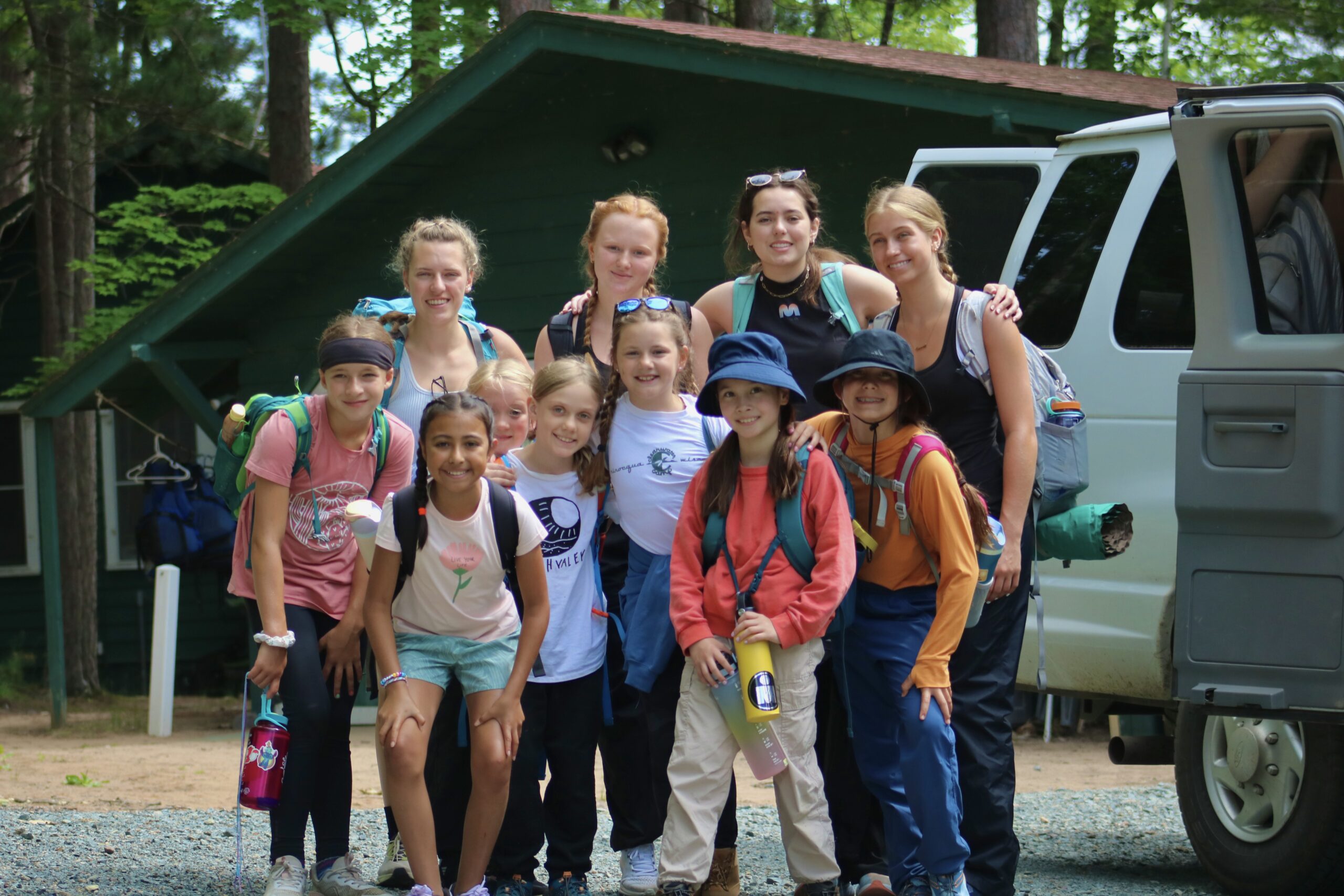At Clearwater camp every girl goes on a trip, from the overnights on the Harbor to weeklong honor trips for some of the oldest girls. The goal of the trip program is to “develop campers into competent and enthusiastic outdoors- women” through a variety of avenues, including a love of adventure, an appreciation and stewardship of the natural world, and maintaining a positive attitude towards challenge while remaining resilient in the face of adversity.
 These tripping values are reflected in the way several Cape campers explained what tripping meant to them at the end of our canoe trip. Said Halsey D., “tripping is a way to connect with nature and find new skills.” Manuela I. agreed and expanded on that sentiment, saying “tripping is a different place from what we know and it gives us many skills that we can use when we go home and when we get older, and it always makes us stronger.”
These tripping values are reflected in the way several Cape campers explained what tripping meant to them at the end of our canoe trip. Said Halsey D., “tripping is a way to connect with nature and find new skills.” Manuela I. agreed and expanded on that sentiment, saying “tripping is a different place from what we know and it gives us many skills that we can use when we go home and when we get older, and it always makes us stronger.”
Tripping is for everyone, no matter whether it is your first or ninth year at camp. As Bridget W. explained, “tripping is really fun because even if you’ve been on a trip before you always learn something new, and it’s a good experience if you haven’t been on one before.”
For those first-time trippers, getting out on trail is mostly about the fun, but also learning to be more independent and bond with the others on the trip. According to Jess Platt, head of tripping at Clearwater, “our harbor trips are designed to introduce the tripping experience in a fun and positive way. We want to create a sense of wonder and accomplishment in our youngest campers to spur interest for trips in the future.” These goals are reflected in camper commentary about tripping. As Lizzy M. said, “It’s an experience to test your limits and to get to know the people on your trip better and get closer.” Another Harbor girl, Julia B., likes “that we get to see a lot of wildlife and that we have to work to get where we need to go.” Many girls on the Harbor love to share the fun stories from their trips, from a family of ducks coming at their canoes to playing games in their tent. For them, it is about learning to love nature and being out on the trail, while also facing a few challenges.
 On the Cape, campers start to expand their skill sets and learn to overcome adversity. Said Platt, “our Cape and early Point trips are all about building technical skills and teaching campers to be more independent on trail. There is lots of collaboration between trip leaders and trippers on tasks like: cooking dinner, pumping water, setting up camp, and travel.” Cape campers talked about what they learned on trips. As Anna B. mentioned, she liked “how you get to use skills in camp and apply them out to where you need them most.” Each experience not only provides these specific skillsets, but teaches independence, problem solving, and teamwork. As one Cape camper put it, “Tripping is really fun and it teaches you a lot about yourself and other people and gives you skills that help you grow.”
On the Cape, campers start to expand their skill sets and learn to overcome adversity. Said Platt, “our Cape and early Point trips are all about building technical skills and teaching campers to be more independent on trail. There is lots of collaboration between trip leaders and trippers on tasks like: cooking dinner, pumping water, setting up camp, and travel.” Cape campers talked about what they learned on trips. As Anna B. mentioned, she liked “how you get to use skills in camp and apply them out to where you need them most.” Each experience not only provides these specific skillsets, but teaches independence, problem solving, and teamwork. As one Cape camper put it, “Tripping is really fun and it teaches you a lot about yourself and other people and gives you skills that help you grow.”
As campers start to go on the longer Point trips, they continue to build on the skills they learned on shorter trips but with greater expectations for independence and leadership. Platt explained that “our older point trippers are expected to have a beginner mastery of these camp craft skills. On these trips, the focus shifts to developing soft skills. Campers with questions are encouraged to address them first to other members of the group before seeking help from trip leaders. Trip leaders will facilitate growth in small group communication skills and reflective thinking about the group process that will serve them well in the next stage of longer trips.”
 Point campers such as Jamie T. find that on trips, you “learn to put others before yourself, and how to cook and pitch your own tents.” According to Jamie, “it makes me grateful for everything I have.” Beyond those hard skills, campers find that their greatest memories, challenges, and bonds are created on the trail. “The best memories come from tripping. The bond we make as a group and the skills we learn through tripping aren’t just for a trip, they are applicable to all aspects of life,” said Darien G. According to Emily D., it is through the trials on a trip that those close bonds are created, for tripping “pushes you to your limits. You’re with a group of people you may not be super close with … it pushes people together and forms bonds that may not have some out at camp.”
Point campers such as Jamie T. find that on trips, you “learn to put others before yourself, and how to cook and pitch your own tents.” According to Jamie, “it makes me grateful for everything I have.” Beyond those hard skills, campers find that their greatest memories, challenges, and bonds are created on the trail. “The best memories come from tripping. The bond we make as a group and the skills we learn through tripping aren’t just for a trip, they are applicable to all aspects of life,” said Darien G. According to Emily D., it is through the trials on a trip that those close bonds are created, for tripping “pushes you to your limits. You’re with a group of people you may not be super close with … it pushes people together and forms bonds that may not have some out at camp.”
Long trips provide greater opportunity for challenges, but also triumphs. According to Platt, “on our extended trips, each tripper will learn how to take more ownership and responsibility for her trip experience. They will be practicing leadership skills such as decision-making and group management; as well as learning to take a big picture view of the tripping process. Campers on extended trips are responsible for meal planning, assigning day-to-day tasks, and get to see what it takes to plan a weeklong trip in the wilderness.” It is through this heightened responsibility for the tripping experience that campers are able to test their own limits and grow as individuals. As Mary S. stated “I’ve learned a lot about myself through tripping because there’s rough times that are hard to get through but through it you get to experience a whole different side to our world in its raw and natural state. The best memories come from tripping and you make some of the best friends.”
 First session provided trips that went everywhere from across Tomahawk Lake to a state park in Michigan to the Porcupine Mountains to Isle Royale. Looking ahead, Platt hopes to continue to fulfill her goal which is “to provide each camper with a tripping experience that sparks confidence and thoughtfulness. Camp is a place to slow down and get away from the busy world; trips are a place to challenge yourself and look inward while surrounded by the peace of nature and the strength of other clearwater daughters.”
First session provided trips that went everywhere from across Tomahawk Lake to a state park in Michigan to the Porcupine Mountains to Isle Royale. Looking ahead, Platt hopes to continue to fulfill her goal which is “to provide each camper with a tripping experience that sparks confidence and thoughtfulness. Camp is a place to slow down and get away from the busy world; trips are a place to challenge yourself and look inward while surrounded by the peace of nature and the strength of other clearwater daughters.”





By Kat Bramley